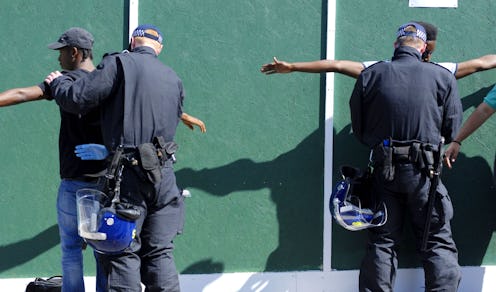Social Justice
New IPOC Report Criticises The Met’s Stop & Search Practices
In one instance, two Black men were suspected of dealing drugs after fist-bumping.

The Independent Office For Police Conduct (IPOC) has released its findings from five investigations it conducted into the stop and search of Black men by Metropolitan Police officers. In their report, the IPOC states that the Met's tactics are "undermining" the legitimacy of stop and search.
Writing about the rules around stop and search, the gov.uk website says: "The police can stop and question you at any time – they can search you depending on the situation." If officers have "reasonable grounds" to suspect you're carrying illegal substances, weapons, or stolen property, then they're permitted to search you.
The IPOC's key findings from the investigations found that the practice of stop and search was being undermined by:
- a lack of understanding about the impact of disproportionality
- poor communication
- consistent use of force over seeking cooperation
- the failure to use body-worn video from the outset of contact and
- continuing to seek further evidence after the initial grounds for the stop and search were unfounded
In one instance, the IPOC found that two Black men had been suspected of dealing drugs after they "fist-bumped." In two investigations, "the smell of cannabis" was the sole grounds given for a stop, the IPOC states, despite this being "counter to policing practice." Another instance saw a Black man in possession of someone else’s credit card be suspected of having stolen it even after providing a credible explanation.
The IPOC found handcuffs were used in "nearly all instances," even when the use of another tactic could have de-escalated the situation.
The troubling report comes just a few days after it was revealed Black, Asian, and minority ethnic people were five times more likely to be stopped by police in the UK.
The IPOC said officers demonstrated a "lack of understanding" when it came to why their actions were deemed to be discriminatory.
"The review mirrors concerns expressed to us by communities across London," said IPOC London Regional Director Sal Naseem.
The IPOC outlined eleven recommendations for the Met that would help improve their stop and search tactics, including:
- taking steps to ensure that assumptions, stereotypes and bias (conscious or unconscious) are not informing or affecting officer’s decision making when carrying out stop and searches, especially when using these powers on people from Black communities
- ensuring stop and search training incorporates a section on de-escalation, including the roles of supervisors and colleagues in controlling the situation and providing effective challenge
- ensuring officers exercising stop and search powers are not using restraint/handcuffs as a matter of routine and are only using these tools when reasonable, proportionate and necessary
- amending stop and search records to include a question about whether any kind of force has been used. The records should also state where information about the kind of force will be recorded
- supervisors taking a proactive role in monitoring and ensuring compliance with body-worn video APP and MPS policy
The full list can be seen here.
“Stop and search is a necessary policing tool, but it must be used in the right circumstances and with care," said Naseem.
This article was originally published on